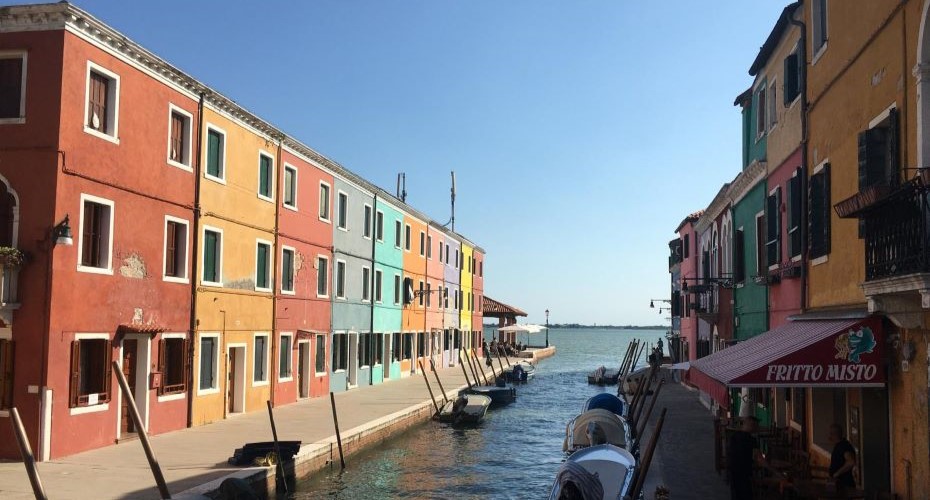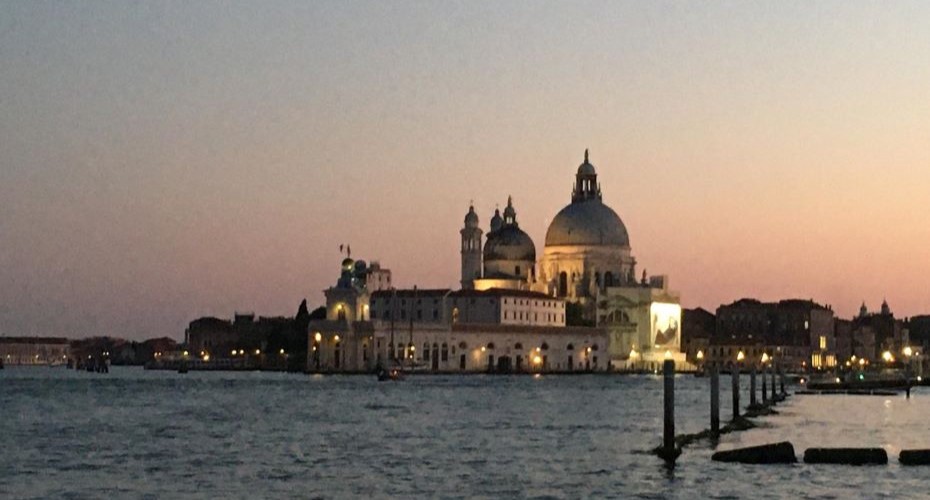This course focuses on the growing interdisciplinary field of Linguistic Landscapes (LL), which traditionally analyses “language of public road signs, advertising billboards, street names, place names, commercial shop signs, and public signs on government buildings”, as they usually occur in urban spaces.
Here are some students (from both Undergraduate and Master’s level) from the University of Exeter who attended the prestigious VIU summer school to share their experiences.
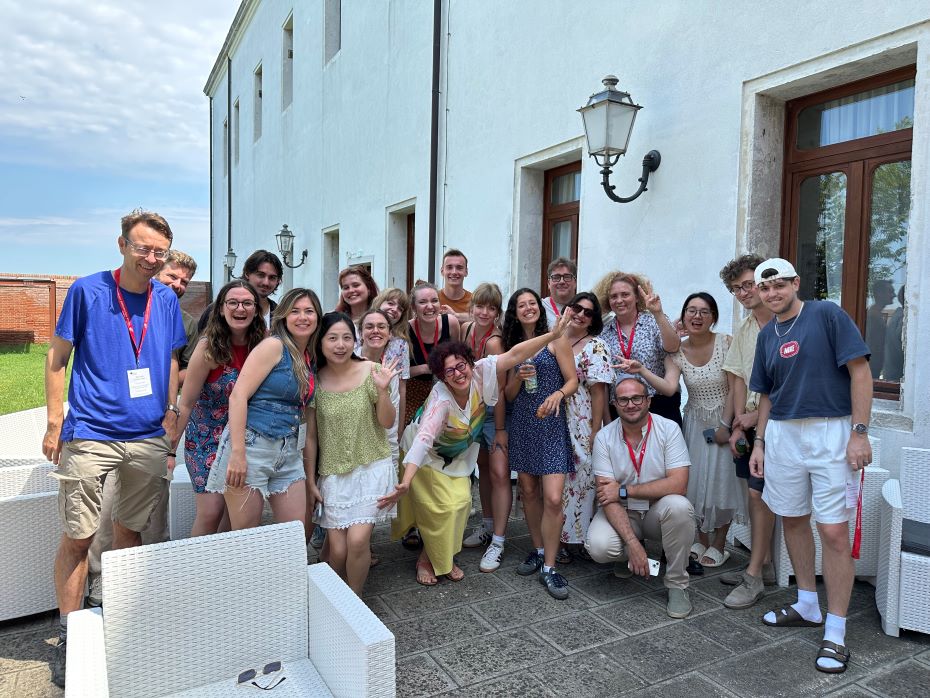
Sophie Paynter graduated in 2025 and participated as a final year student in the 2025 VIU summer school on Linguistic Landscapes. Here is what she says about the summer school.
How do you know you’re having the best summer ever?
You don’t, because you’re living in the moment. It’s when you look back that you realise how good it was. That’s how I feel about my week in Venice last summer, prompted by my being invited to participate via my Outlook inbox. I thought at first, that it maybe wasn’t really intended for me; maybe it was just one of those ‘send-to-all’ type emails that seem to come around every day or so. However, what is so great about this opportunity is that I think really anyone could get something out of this, even someone who spoke only English.
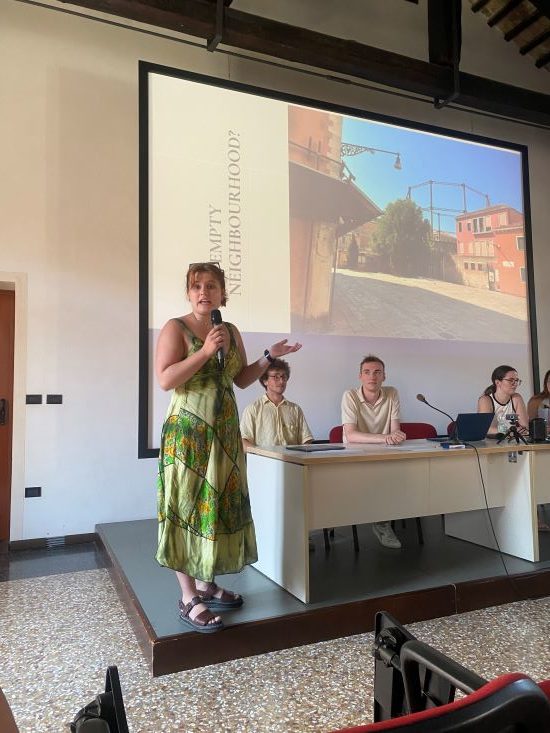
The core idea is about translating cities: understanding the ideas and sentiments that are communicated to us by cities through its semiotic landscape. When you read graffiti, you are engaging in this kind of work, internalising messages that the urban landscape is transmitting. If this is something you do regularly and you would like to do more of, while also learning how this relates to academic literature, this summer school is definitely for you. You will feel enriched by the academic environment, supported by excellent professors from many different universities while also being surrounded by a group of students who are like-minded in significant ways, but also come from different academic foundations so will bring fresh and interesting ideas to the table which are different from yours.
It’s quite rare as an undergrad to be immersed in an environment like this. I would really describe the experience as a multidisciplinary hotbed of ideas in a beautiful setting. The grounds are just stunning. The university takes up pretty much the whole of San Servolo, one of the 118 islands in the Venetian Lagoon. You will be able to walk round the grounds at lunchtime and after sessions and take in the beautiful, the greenery as well as the sea. The food was also amazing. The chefs and front of house staff in the restaurant are so friendly and very accommodating of different alimentary needs (I am vegan and they were able to prepare me something fresh, new and beautiful every day so I was allowed to leave my packed lunch on the mainland from the second day onwards). The work consists of being put in a team. Meeting and working with my team was one of the most amazing elements of my experience at the summer school. You explore a part of Venice that you are assigned and complete a presentation on it by the end of the week. It’s really nice to have the freedom to explore but also an academic focus. I found it helped me to extract the most out of Venice. You may have been to Venice before, but you’ve never explored it as you will when you’re part of the Linguistic Landscapes Team. I could not recommend this summer school enough.
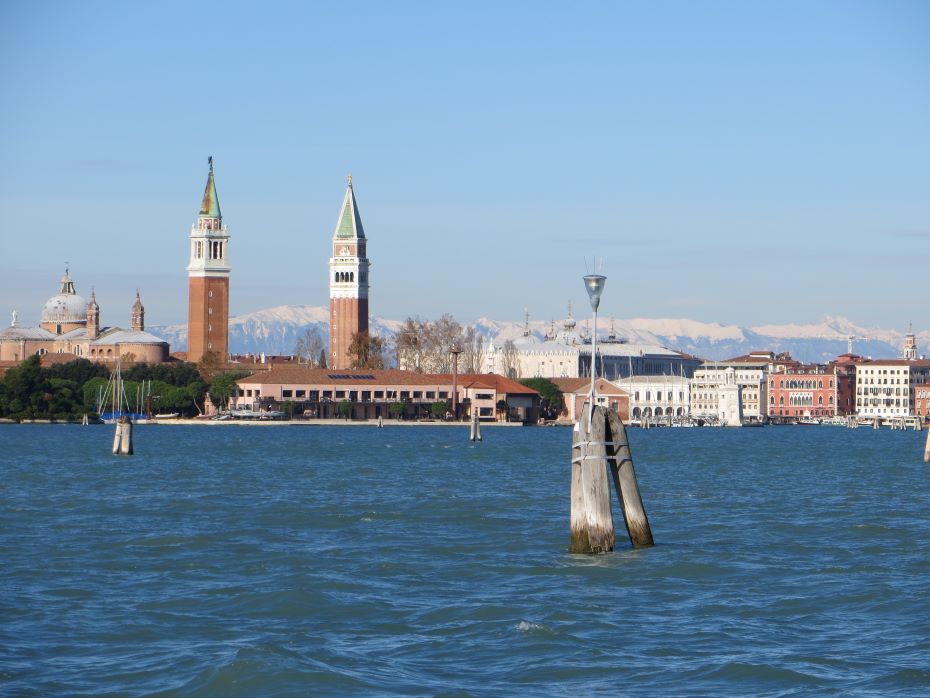
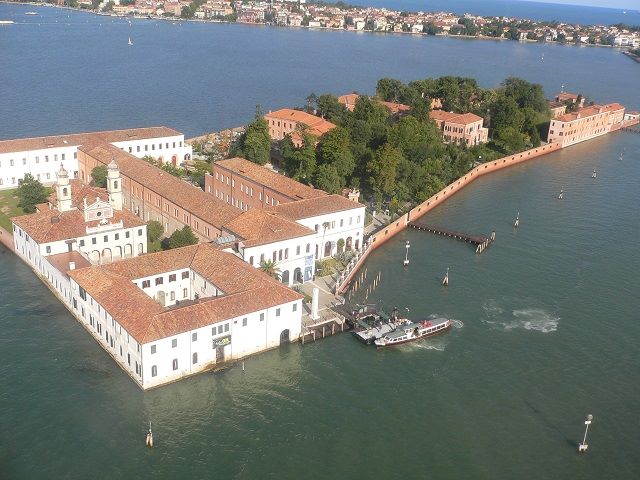
Laura Jacinto completed her MA in Translation Studies in 2025, received an LCVS bursary and participated in the 2025 VIU summer school on Linguistic Landscapes. Here is what she says about the summer school.
Tell us a bit about your Venice experience as a Master student!
In the middle of my Master’s in Translation Studies, I applied to the VIU Summer School without fully realising how profoundly it would shape both my academic development and my future career. The locations in Venice and on San Servolo offered an exceptional and inspiring environment, where historic settings, everyday urban life, and academic inquiry came together seamlessly.

The programme stood out for its rich variety of lectures, seminars, and especially hands-on activities, covering topics such as linguistic landscapes, graffiti and writing on walls, multimodal semiotics, urban planning, visual arts, and innovative methodologies such as eye-tracking. What made the experience particularly impactful was the close connection between theory and practice: we explored Venice in real life, engaging with both touristic areas and local, lived spaces, and analysing signs, urban architecture, inscriptions, and everyday texts as part of a living urban environment and its social impact.
Working collaboratively with international students was one of the most rewarding aspects of the summer school, as it allowed us to exchange perspectives, compare linguistic landscapes from many different parts of the world, and build strong academic and personal connections while also enjoying a vibrant and welcoming social life. The professors were extremely approachable and easy to engage with, always open to discussion across a wide range of topics, which created a supportive, inclusive, and intellectually stimulating atmosphere. It was particularly meaningful to be part of such a diverse academic community, that created space for valuable conversations about what it means to be an academic today, women in research, current trends in the field, ethics, and the challenges of balancing academic work with personal life.
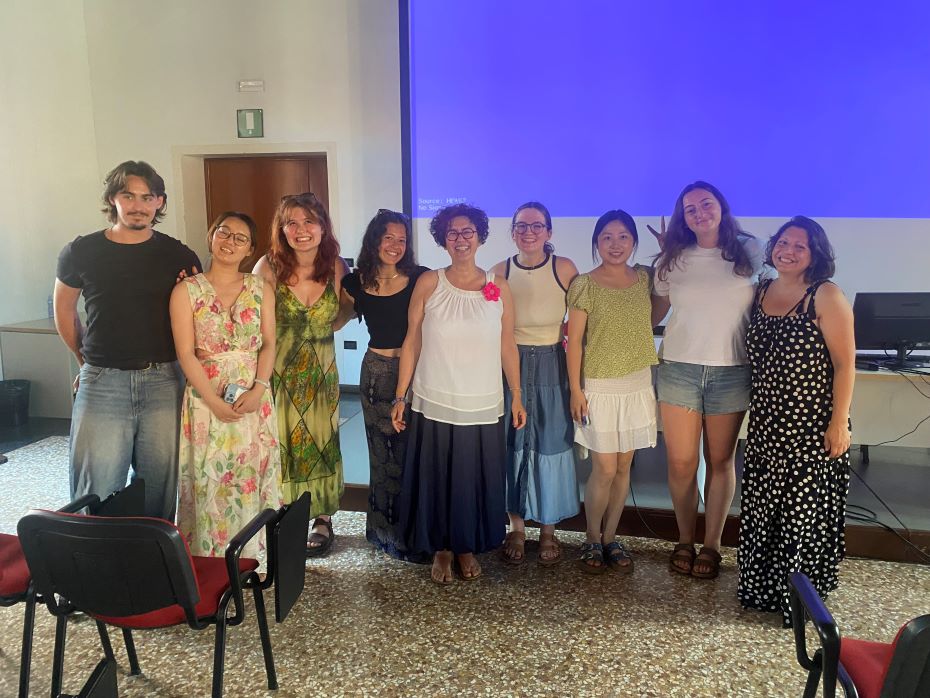

This experience had a direct impact on my academic trajectory and played a key role in shaping my research interests. Shortly afterwards, I carried out independent fieldwork in western Spain, focusing on minority languages along the Iberian border, where I applied the methodologies, ethical considerations, and interdisciplinary approaches I had learned in Venice. This work later developed into my dissertation, Invisible Words: The Absence of the Extremaduran Language (Estremeñu) from Urban and Border Linguistic Landscapes, completed with distinction, and opened the door to presenting my research in October at the WISPS XXV Annual Conference, Transforming Narratives, at the University of Exeter.
Overall, the VIU Summer School was an intense, inspiring, and deeply enriching experience that opened the door to a supportive and international academic community. I am extremely grateful for the bursary, which made my participation possible and allowed me to fully engage with this exceptional opportunity in this beautiful vibrant city, and I would wholeheartedly recommend.
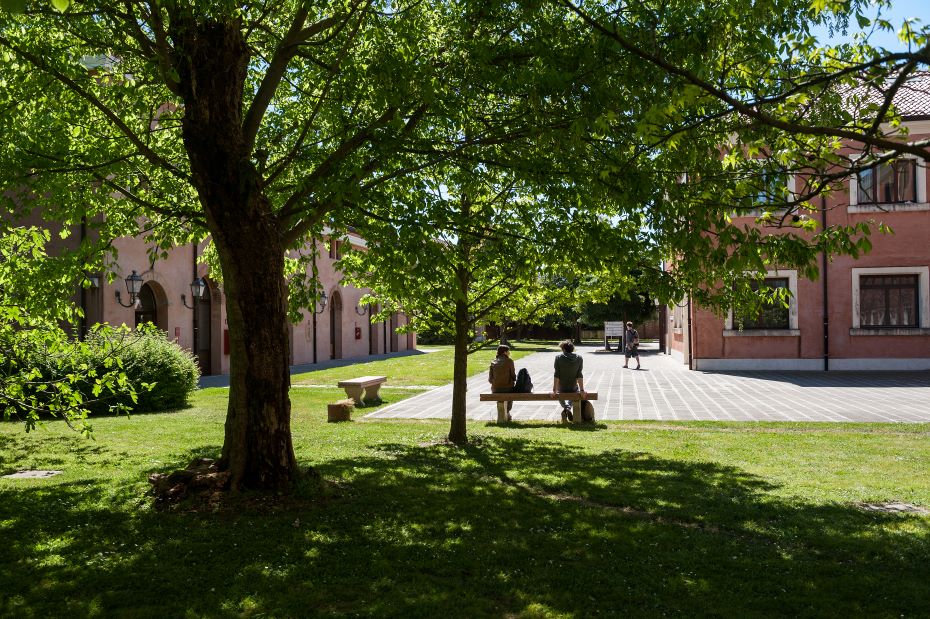
Eliza Martin graduated in 2025, received an LCVS bursary and participated in the 2025 VIU summer school on Linguistic Landscapes as a finalist. Here is what she says about the summer school.
Thinking back, what do you think about the VIU summer school? Would you recommend it?
I’m so grateful that I had the opportunity to attend the Linguistic Landscapes Summer School and for the support of the LCVS bursary. Having finished my final-year assessments, it was a lovely way to celebrate the hard work while learning about a new area of study.
The VIU summer school on Linguistic Landscapes was a unique and immersive experience. We explored the subject matter through a range of lectures and field studies, brought to life by insights from an excellent selection of international speakers. Learning about and immediately interacting with eye-tracking technology in the field was particularly exciting. Alongside this, the framework designed to guide our studies gave us a rare lens through which we were able to connect with the city and its residents, exploring the small but visceral signs of culture that are often disregarded or completely missed. I now engage far more actively with my environment and feel that I have been equipped with useful tools for reflecting on the social, cultural and political dynamics of a community through signs and language.
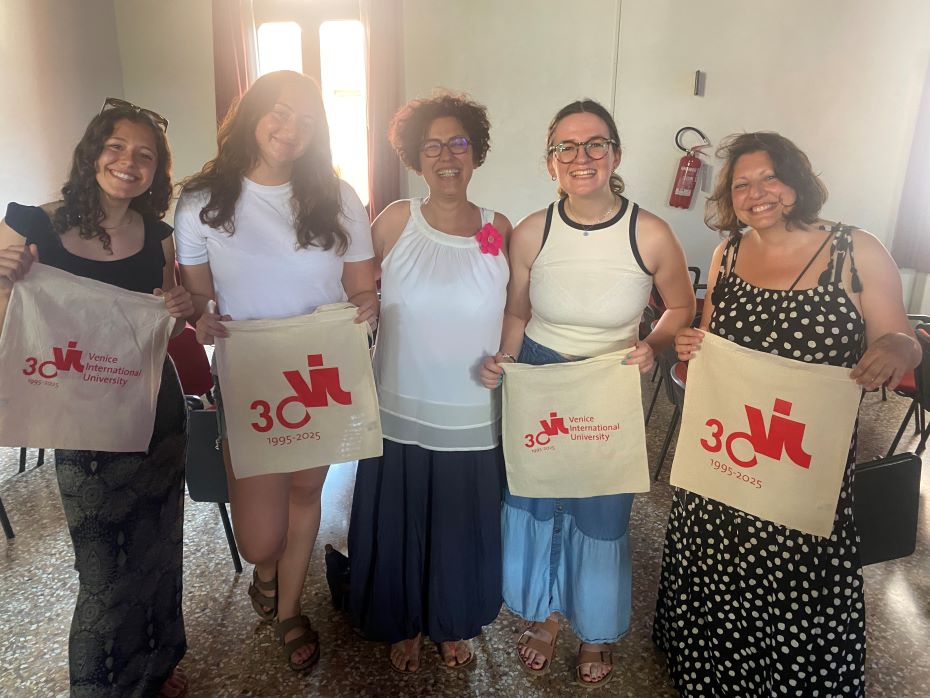
Beyond the academic content, the fantastic location of San Servolo Island was another highlight— nothing beat watching the sunset over the water and the city from the docks. Ultimately, however, the course was made by the people. The lecturers brought a wide range of expertise while keeping the course fun and dynamic, and the diverse backgrounds of all the international students brought engaging conversations. The bonds we formed over meals and the occasional cheeky aperitivo, were unforgettable and strengthened through exploring the city together in our spare time. All I can say is, send in that application now, you won’t regret it… and don’t forget to pack your fan and mozzie spray!
Two further students also share their experiences of receiving a LCVS bursary to attend the prestigious VIU’s summer school on Linguistic Landscapes in June 2024.
Emily Cooper (UG, Exeter; MA in Translation Studies, Exeter)
What was so special about this school?
The VIU summer school, ‘Linguistic Landscapes: Using Signs and Symbols to Translate Cities’, provided me with an invaluable opportunity to explore the intersemiotic nature of the notion of linguistic landscape (LL) within the Italian context. The combination of in-class lectures, theoretical readings and practical activities equipped me with a comprehensive understanding of how elements of Italian culture shape, and are shaped by, the LL.
Was the school relevant to your academic career?
Yes, it was. The school was extremely important in supporting my own studies, since at the time of the school I was due to begin writing my MA Translation Studies dissertation, entitled: ‘A Sign of the Times: Reading Italian Neorealist Films Through the Lenses of Translation and Linguistic Landscape Studies’.
What did you like about this school?
I really liked the wide variety of lectures given by specialists in translation, architecture, history and technology which demonstrated the dynamic, multifarious nature of LL studies. I also loved working with students from different countries and disciplines, which introduced me to a variety of perspectives surrounding the field.
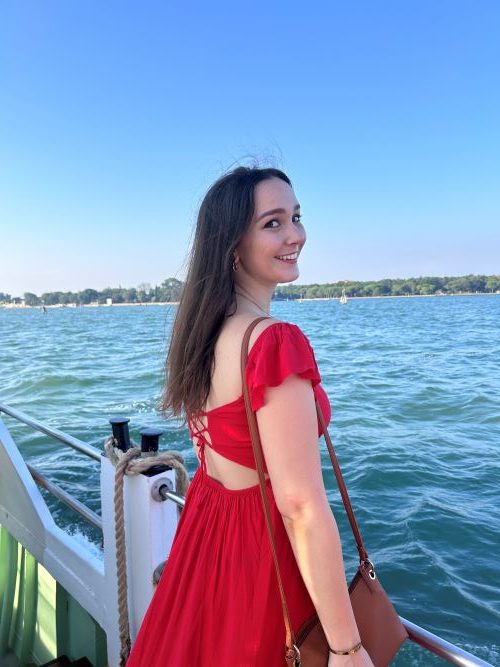
Was the school relevant to your academic career?
Yes, it was. The school was extremely important in supporting my own studies, since at the time of the school I was due to begin writing my MA Translation Studies dissertation, entitled: ‘A Sign of the Times: Reading Italian Neorealist Films Through the Lenses of Translation and Linguistic Landscape Studies’.
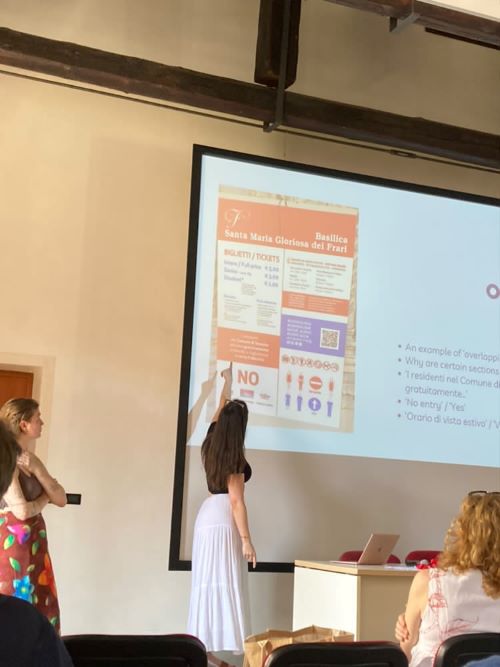
What was memorable?
A memorable part of the experience was collaborating with international students to produce a group project investigating the use of multilingual signage around the Frari district of Venice. It was interesting to witness how Venice’s LL reflects the city’s sociolinguistic context, and how the languages/dialects used in signage can exclude certain individuals from the city’s discourse.
In fact, it appeared that the refusal to translate information from Venetian dialect or standard Italian represented a form of resistance against the influxes of tourism, exhibiting how the LL can be used to reinforce power dynamics.
Did you speak Italian in Venice? Was it good?
Yes, I did! As a student of Italian, the experience underlined how my knowledge of the language enables me to uncover deeper layers of meaning in signage, particularly through the interplay of words, images, and symbols to convey meaning. I will never forget my time studying at VIU, and I firmly believe that everything I learned played a pivotal role in the success of my MA dissertation.
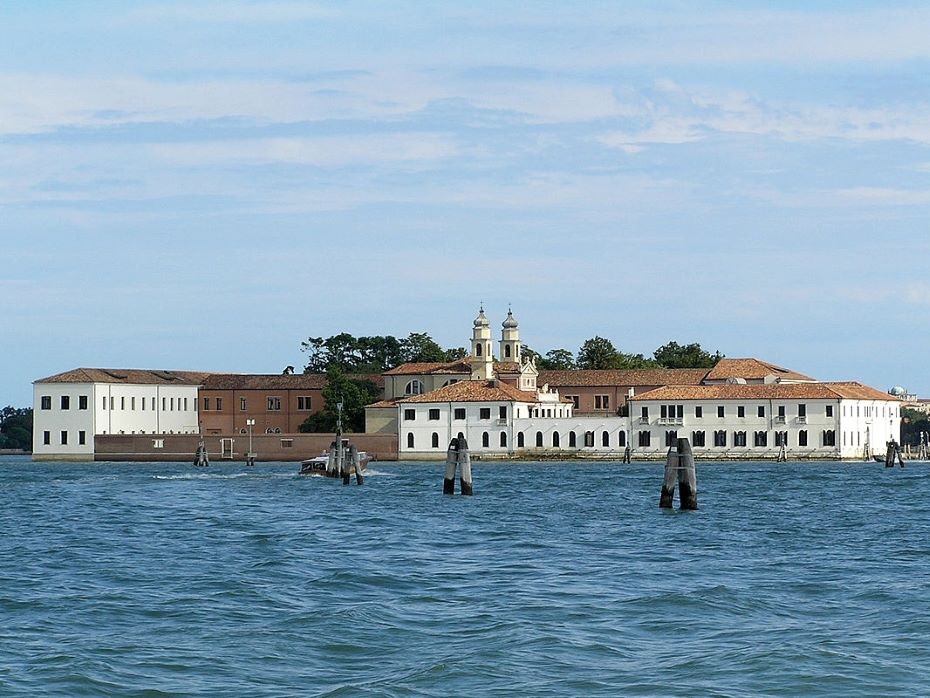
Ignes Bordwell Silva Caravieri (UG, Exeter; MA in Translation Studies, Exeter)
What was so special about this school?
I am very grateful to have been given the opportunity to participate in the VIU Linguistic Landscapes summer school. There is, of course, the obvious: Venice is a beautiful, unique city, and a joy to be in. The history, the food, the views – an undeniable part of summer school’s allure is going on holiday!
Was the school relevant to your academic career?
Yes! This was first and foremost an academic opportunity. It was an opportunity to make connections with academics and fellow students who share similar passions, and to understand their different points of view and research interests. The summer school’s focus (the titular Linguistic Landscapes) is an incredibly interesting multidisciplinary field. Its combined focus of both the linguistic and the visual allowed for a perfect conjunction of my primary interests: visual culture and analysis, which I studied in my bachelor’s in art history, and language, which I would go on to study further in my master’s in translation. This was a unique opportunity to combine my academic interests, and be introduced to a new, exciting field of study in the process.
What did you like about this school?
The week of lectures and “touristing” culminated in a group project which gave us the chance to try our hand at Linguistic Landscapes fieldwork. Set loose in different areas of Venice, each group was free to tackle whichever subject we chose. Undertaking this while in Venice was a particularly exciting dynamic. The lens of Linguistic Landscapes allowed us to travel the city with a completely different mindset than one would normally do, visual-linguistic researchers instead of residents or visitors. One of the biggest tourist destinations in the world, and a city with a completely unique urban profile, Venice’s peculiarities make its study all the more fascinating.
What was your project about?
My group undertook a project to analyse the linguistic landscape of the messages often found on metal surfaces throughout the city: on stickers or sheets of paper taped to items such as electrical boxes, ATMs, and pipes.
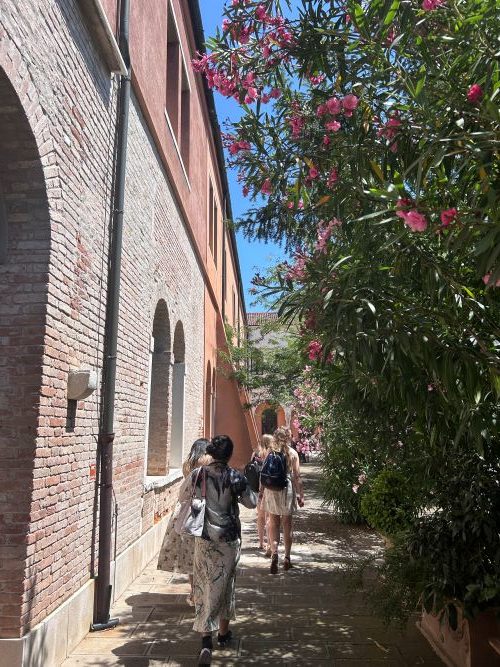
From this analysis of the linguistic landscape at a micro-level, we were able to see the reflection of this global city’s wider social dynamics. A brief example: the messages displayed by stickers in thoroughfares were often written in English and addressing global political concerns, while on residential streets, workers and migrants offered their services in Italian, reaching out to the dwindling Venetian resident community. This linguistic landscape divide reflects Venice’s positioning – a touristic, internationalised city that turns evermore touristic and international, permanent residents constantly encouraged to sell their homes (which are later often turned into airbnbs). Flyers flow out of overstuffed mailboxes by the dozens, real estate agencies pleading to buy or rent Venetians’ homes. At no point, however, was our analysis straightforward. Even when restraining ourselves to only one medium, linguistic landscapes continuously proved themselves multilayered and complex, often reflecting the discordant views and attitudes one finds in any city. Instead of attempting to impose on them a master narrative, it might be more accurate to say that through its linguistic landscape we detected many competing narratives of the city.
What was memorable?
It was an unforgettable occasion, and a prime opportunity to hone one’s research, critical thinking, groupwork, and presentation skills. Spending a holiday in Venice wasn’t too shabby either.
